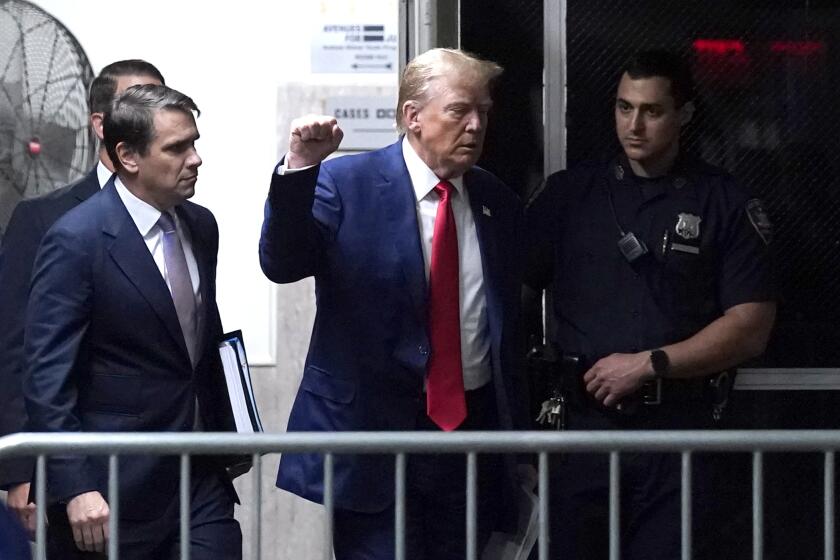Auto Fee Rollback May Be in Jeopardy
One of the casualties of the state’s fiscal woes could be a popular tax cut enjoyed the last three years by California drivers: the dramatic rollback in annual vehicle licensing fees.
The fee has dropped by 67.5% since 1998, when lawmakers began adopting a series of reductions. This fiscal year alone, the rollback is expected to save Californians $3.5 billion.
But now, with the state facing a budget deficit projected at $12.4 billion, some legislators and local officials are studying the possibility of revoking some or all of the tax reduction.
Because cities and counties depend on money from the vehicle license fee, the state agreed when it reduced the fee to make up the lost revenue to local governments. But a provision of the 1998 rollback, signed by then-Gov. Pete Wilson, said if the state fell on hard times and was no longer able to cover any portion of the cut, the tax would be allowed to rise by a like amount.
Sen. Tom Torlakson, the Antioch Democrat who chairs the Senate Local Government Committee, has been meeting with local officials from throughout the state to determine whether they are willing to support a rise in the fee.
The idea probably will be in play when the Legislature reconvenes in January, although it’s far from a sure thing. Republican legislators are opposed to any tax hike, and Gov. Gray Davis has not said whether he will support an end to the rollback.
Keeping the tax cut but ridding the state of its obligation to local governments--a possibility that worries cities and counties--would require a change in law.
Davis, who is up for reelection next year, has not announced plans to withhold the money from local governments, nor has he ruled it out.
“We are hoping to avoid having to do something like that, but at this point everything is on the table,” said Sandy Harrison, a spokesman for the state Department of Finance.
So far, Davis has sought to address California’s fiscal woes through a combination of spending cuts and stimulus measures, as opposed to tax increases. He released a plan Wednesday to cut a combined $3 billion out of the state’s current budget and the next one.
Still unclear, however, is how the governor plans to cover the remaining deficit, should it materialize to the tune of roughly $9 billion, a sum that will only grow if the state’s recovery is delayed or lawmakers refuse to sign off on Davis’ proposed spending reductions.
Allowing vehicle license fees to rise, which could save the state as much as $4 billion in the 2002-03 fiscal year, is receiving mixed reviews from lawmakers.
Senate Leader John Burton (D-San Francisco) has said in recent weeks that the time has come to reconsider tax cuts--and the vehicle license fee reduction in particular--enacted when times were good.
Burton’s suggestion illustrates a divide in Sacramento, with more liberal Democrats willing to consider tax increases in addition to spending cuts to balance the state’s budget.
GOP lawmakers have made it clear that they oppose tax hikes.
Sen. Tom McClintock, the Thousand Oaks Republican who has pushed for the vehicle license fee to be abolished, said he would adamantly oppose doing away with any of the current cut. He contends that it would require a two-thirds vote of the Legislature to allow the tax to increase.
“Republicans would be united in their opposition,” McClintock said. “There is no excuse for raising additional taxes at a time when families are already being pushed to the wall by this recession.”
At the same time, Republican lawmakers have urged Davis to protect funding for local governments.
Two dozen GOP senators and Assembly members sent a letter to the governor earlier this month reminding him of the state’s responsibility to pay back local governments for the car-tax cut. They noted that discretionary funds are used by their local counterparts to pay for public safety, trauma care, emergency services and airport security.
Concerns over funding for local governments are fanned in part by steps taken by the state to balance the budget during the last recession. Faced with massive deficits, state officials began diverting billions of dollars from local coffers during the 1992-93 fiscal year. The funding shift, for which local jurisdictions have never been fully compensated, threw many local governments into turmoil.
More to Read
Get the L.A. Times Politics newsletter
Deeply reported insights into legislation, politics and policy from Sacramento, Washington and beyond. In your inbox three times per week.
You may occasionally receive promotional content from the Los Angeles Times.






